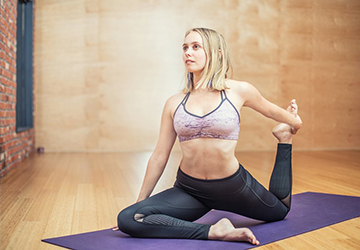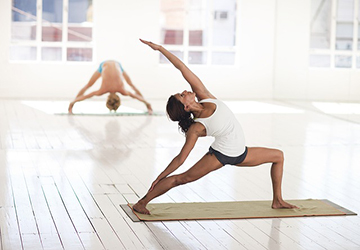Yoga for Beginners: Poses and Benefits
For thousands of years, yoga has been a practice that encompasses physical, mental, and spiritual aspects. It is a popular form of exercise and relaxation that promotes flexibility, strength, and balance. Yoga is not just for the experienced or the flexible, but it is also suitable for beginners. This article will explore yoga for beginners and discuss the various poses and benefits.
Yoga Poses for Beginners
Mountain Pose (Tadasana)
Mountain Pose is a foundational yoga pose that is perfect for beginners, and it is a standing pose that focuses on grounding and centering. Assume the Pose by standing with your feet apart at hip-width, pressing them firmly onto the ground, and raising your arms above your head. Hold the Pose for several breaths, feeling the strength and stability of your body.

Downward-Facing Dog (Adho Mukha Svanasana)
The Pose, known as Downward-Facing Dog, is a widely practiced yoga posture that targets the hamstrings, calves, and spine for stretching. Assume the initial position by placing your hands and knees on the ground, keeping your hands at a distance equal to the width of your shoulders and your knees at a distance equivalent to the width of your hips. Create an inverted V-shape with your body by lifting your hips up and back while straightening your arms and legs. Maintain the posture for a few breaths, concentrating on elongating your spine and releasing any tension in your neck and shoulders.
Warrior II (Virabhadrasana II)
Warrior II is a powerful standing pose that strengthens the legs, hips, and core. Begin in Mountain Pose, then step your left foot back and turn it out to a 90-degree angle. Bend your right knee, ensuring it stays aligned with your ankle, and extend your arms to the sides. Hold the Pose for several breaths, feeling the strength and determination of a warrior.
Tree Pose (Vrksasana)
Tree Pose is a balancing pose that helps to improve focus and concentration. Start by assuming the Mountain Pose, then transfer your body weight onto your left foot and elevate your right foot to rest it on the inner thigh of your left leg. Place your hands in prayer before your heart, and hold the Pose for several breaths. Repeat on the other side.
Child's Pose (Balasana)
The Child's Pose is a restorative pose that helps to release tension and stress. Begin on your hands and knees, then sit back on your heels and extend your arms forward, resting your forehead on the ground. Hold the Pose for several breaths, feeling the calming and nurturing energy of the Pose.
Benefits of Yoga for Beginners
Improves Flexibility
Practicing yoga can be an excellent method for enhancing one's flexibility and expanding their range of motion. You can stretch and lengthen your muscles, tendons, and ligaments by practicing yoga poses. This increased flexibility can help to prevent injury and improve athletic performance.
Builds Strength
Yoga is also a great way to build strength, particularly in the legs, arms, and core. Many yoga poses require holding a position for several breaths, which can help to increase muscle endurance and tone. Additionally, some poses require using your body weight as resistance, which can further increase strength.
Reduces Stress and Anxiety
Yoga is known for its ability to reduce stress and anxiety. By focusing on the breath and practicing mindfulness, yoga can help to calm the mind and relax the body. This can be particularly beneficial for beginners experiencing anxiety or stress about starting a new exercise program.
Improves Balance and Coordination
Yoga requires excellent balance and coordination, which can benefit beginners looking to improve these skills. By practicing balancing poses, such as Tree Pose, beginners can improve their overall balance and coordination, which can be helpful in daily activities and sports.
Promotes Relaxation and Better Sleep
In addition to reducing stress and anxiety, yoga can promote relaxation and better sleep. Many yoga practices focus on calming the nervous system and promoting deep peace, which can help to improve sleep quality and duration.

Enhances Mind-Body Connection
Yoga is a holistic practice that promotes the connection between the mind, body, and spirit. By focusing on the breath and practicing mindfulness, yoga can help to increase awareness and create a deeper understanding of the mind-body connection.
Improves Respiratory Function
Many yoga practices incorporate breathing exercises, known as pranayama, which can help to improve respiratory function. By practicing deep breathing techniques, beginners can increase lung capacity and improve respiratory health.
Boosts Immune System
Studies show that regular yoga practice can enhance the immune system through the stimulation of antibody production and improved lymphatic circulation. This can help to reduce the risk of illness and improve overall health and well-being.
Encourages Self-Care and Self-Acceptance
Yoga is a practice that encourages self-care and self-acceptance. By focusing on the present moment and practicing non-judgment, beginners can cultivate a sense of self-awareness and acceptance. This can be especially advantageous for individuals who experience body image or self-esteem challenges.
Tips for Beginners
If you are new to yoga, it is essential to approach the practice with an open mind and a willingness to learn. Below are some suggestions that can assist you in commencing:
Start with a Beginner's Class
There are many different styles of yoga, and some may be more suitable for beginners than others. Consider starting with a beginner's class or a gentle yoga practice to build a foundation of knowledge and experience.
Listen to Your Body
Yoga is a practice of self-awareness and listening to your body. Pay attention to discomfort or pain, and adjust your routine as needed. It is better to take a break or modify a pose than to push yourself too hard and risk injury.
Focus on the Breath
The breath is a central element of yoga practice. Focus on deep, steady breathing throughout your training to promote relaxation and mindfulness.
Use Props
For beginners, yoga props like blocks, straps, and blankets can be helpful. They can help to support the body and make certain poses more accessible.
Be Patient and Kind to Yourself
Remember that yoga is a practice, and progress takes time. Be patient with yourself, and avoid comparing your practice to others. Celebrate your progress and focus on the benefits of the procedure.
Takeaway:
Yoga is a powerful practice that offers a wide range of benefits for beginners. Whether you want to improve flexibility, build strength, reduce stress, or improve overall well-being, yoga can be a valuable addition to your life. By focusing on the breath and practicing mindfulness, beginners can cultivate a deeper self-awareness and connection with the mind, body, and spirit. Start with these basic yoga poses and tips, and enjoy the many benefits of yoga.


